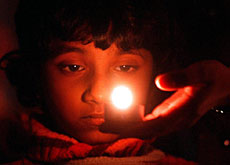“It’s like a nuclear bomb has gone off”

The coordinator of Swiss relief efforts in Indonesia has warned that the humanitarian crisis following last month’s undersea quake is still not under control.
Andreas Graf was speaking to swissinfo as Switzerland stepped up its relief effort in the province of Aceh on the northern tip of the island of Sumatra.
Aceh lies close to the epicentre of the December 26 quake, which measured 9.0 on the Richter scale.
About 100,000 people are confirmed dead in northern Indonesia, while nearly 400,000 have been left homeless.
Aid agencies warn that the death toll is likely to rise as rescuers reach areas which have until now remained inaccessible.
Switzerland is sending emergency-relief supplies to Aceh by air and the five-strong Swiss contingent already in Sumatra is due to be strengthened in the next few days by a team of water-sanitation experts.
Graf, who is coordinating the Swiss Humanitarian Aid Unit’s relief effort from the port city of Medan, arrived in Indonesia on Friday.
swissinfo: The United Nations says the world has yet to grasp the extent of the devastation in Aceh…
Andreas Graf: The members of the Swiss team here all say it is like a nuclear bomb has gone off. Everything has been wiped out. There are only a few buildings remaining in [the provincial capital of] Banda Aceh and in the town of Meulaboh.
Whole villages have been completely destroyed. The coastline has changed forever. What has happened here is [far worse than] an earthquake. This is the very worst natural disaster that you can imagine.
swissinfo: How is Switzerland’s contribution to the relief effort going?
A.G.: Our team in Banda Aceh is desperately waiting for the arrival of flights carrying essential humanitarian supplies. We have [also] been supplying tents for the hundreds of thousands of internally displaced persons.
One of the biggest problems remains the transport of goods into the countryside, but we hope that things will improve with the use of helicopters. The town of Meulaboh has been completely destroyed. It is not yet accessible by road and so it’s proving difficult to get supplies to the people there.
swissinfo: Beyond the logistics of distributing emergency supplies, what are the other challenges facing aid agencies and the Indonesian people?
A.G.: One long-term challenge is that this tsunami has left behind a huge number of orphans. In many cases only one person has survived from a large family and this means that there are a lot of children who need places to stay.
The newspapers here are reporting the first cases of [child] trafficking. I can’t tell you to what extent this is already taking place, but some people are afraid that this kind of thing is going to happen.
Another major challenge will be the reconstruction of essential infrastructure. In Banda Aceh, for example, the problem is not just that the water supply is polluted. The blueprints which showed where the supply actually was have been destroyed, which makes it very difficult and expensive to get clean water flowing again.
swissinfo: Rebels in Aceh province have been fighting for independence from Jakarta since 1979. What impact is this conflict having on the relief effort?
A.G.: I’ve heard about some minor firefights, but [in general] the rebellion hasn’t had too much impact until now. One problem has been that the Indonesian government was reluctant to let foreigners into Aceh after the disaster happened, because it is a closed zone. People working for non-governmental organisations were not allowed access to the province. This hampered efforts in the early stages to ascertain the extent of the damage.
I should also say that some people here believe that the catastrophe could turn out to be a real opportunity for Aceh in the sense that it might help bring the rebels and the government together in a process of reconciliation.
swissinfo-interview: Ramsey Zarifeh
A five-member team sent by the Swiss Agency for Development and Cooperation is currently working in Indonesia.
The team is to be strengthened over the next few days with more experts to help restore drinking-water systems.
Switzerland is also sending essential medical and humanitarian supplies by air to Aceh.

In compliance with the JTI standards
More: SWI swissinfo.ch certified by the Journalism Trust Initiative










You can find an overview of ongoing debates with our journalists here . Please join us!
If you want to start a conversation about a topic raised in this article or want to report factual errors, email us at english@swissinfo.ch.